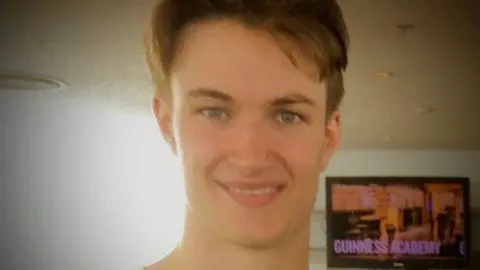'I did the best I could,' says lifeguard following pool death
 Teresa and Malachy Rogers
Teresa and Malachy RogersOne of three lifeguards on trial following the death of a man at a pool in Armagh, said he believes "what I did at the time was the best I could... with the knowledge I had".
Christopher Rogers, 20, died during a swim session at the Orchard Leisure Centre in Armagh in 2017.
Cathal Peter Forrest McVeigh, 35, of Dunamony Road in Dungannon, James Monaghan, 26, of Folly Lane in Armagh and William Holden, 26, of Unshinagh Lane in Portadown were on duty the night he died.
They each face a single count that being employees, they "failed to take reasonable care for the health and safety of other persons who may be affected by [their] acts or omissions at work". All three men have pleaded not guilty.
Newry Crown Court previously heard that on the day of his death Mr Rogers, who was an experienced swimmer, had been swimming underwater for about a minute before breaking the water's surface.
He then descended to the bottom of the pool and lay there for five minutes and 14 seconds before a rescue attempt was initiated.
He was later pronounced dead.
A coroner said he had lost consciousness due to a lack of oxygen.
On Wednesday the case for the defence began. Mr McVeigh, who continues to work as a lifeguard and swim school teacher, gave evidence.
He told the court that at no time did his training focus on shallow water blackout, hypoxia or decerebrate posturing.
During his evidence Mr McVeigh talked about previous rescues in the pool and in his private life including successfully giving CPR to a neighbour who had suffered a heart attack.
He said that in May 2017 he qualified as a trainer assessor which allowed him to train other lifeguards.
"At a guess I've trained about 100 lifeguards from scratch as well as ongoing training for staff in Armagh, Dungannon and Monaghan."
He said that training came from the content of the National Trainer Lifeguard Book.
'I wasn't concerned he was in danger'
On the night of Mr Rogers's death he said, "a member of staff had called in sick so you were maybe poolside for longer than normal".
"I knew and had worked with the others. Then and now I have every confidence in those two gentlemen," he said.
"I came up from the changing area to replace Mr Monaghan."
Mr McVeigh outlined that Mr Rogers had been observed doing lengths of the pool, as well as sitting and lying on the bottom holding his breath.
The court saw Mr McVeigh on CCTV taking a pole, banging the steps to try to get Christopher Rogers' attention.
He told the court he could see Mr Rodgers and "his arms looked to be pushing water up in what I felt were deliberate actions. At that point I wasn't concerned that he was in danger".
Mr McVeigh said he told a swimmer to tell Mr Rodgers to come up from the bottom of the pool. He said Mr Rodgers had given him a thumbs up.
A short time later the swimmer checked on Mr Rogers again, leading to Mr McVeigh jumping into the pool.
Once he'd been taken from the pool Mr McVeigh said he and his colleagues had given him CPR.
'Incorrect assumptions'
"I've thought a lot about it and whether I could have done something different. Hypoxia and seizures are now part of the training", said Mr McVeigh.
Under cross-examination he added: "I've come to the conclusion that what I did at the time was the best I could have done at the time with the knowledge I had at the time."
The prosecutor said Mr McVeigh had made incorrect assumptions about what was happening and that training shouldn't be needed for a lifeguard to intervene in such a circumstance.
Mr McVeigh said he hadn't made assumptions but used what he'd been told and could see to inform his decision.
The prosecutor said: "The only downside (of early intervention) would have been disturbing his exercise and you getting wet".
The trial continues.
